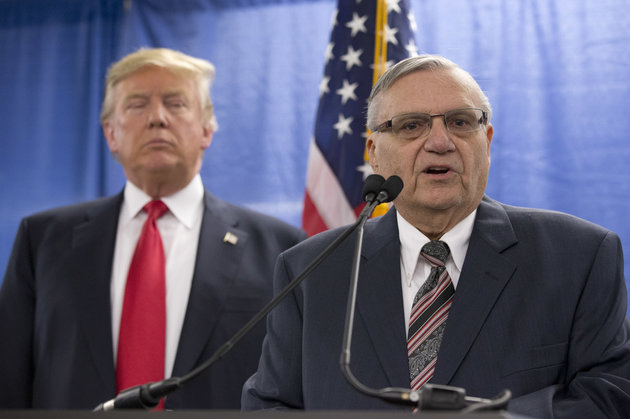
WASHINGTON — Donald Trump has spent the week pedaling backward and forward on his immigration positions, leaving immigration hawks — and some of his biggest boosters — worried about the strength of his support for mass deportations and a blanket ban on Muslim immigrants.
Arizona Sheriff Joe Arpaio, a prominent Trump supporter and immigration hawk, told HuffPost he was perplexed by Trump’s series of unfolding positions.
“He initially said he wanted to deport the 11 million people,” Arpaio said. “So you’re saying he’s now saying he’s not going to deport everybody who’s been here illegally?”
Mark Krikorian, executive director of the Center for Immigration Studies, an influential think tank that calls for stricter immigration laws, said he was similarly concerned.
“His instincts on a lot of these issues are correct. Unfortunately, since he doesn’t know much about the issue, won’t listen to his own advisers, and won’t read his own immigration platform, he ends up veering from one thing to the next,” said Krikorian, who plans to vote for Trump. “This is just another example of Trump’s weakness when it comes to policy.”
Krikorian chalked it up to Trump’s basic approach to politics. “He’s just saying whatever pops into his head at any given moment,” he said. “It’s kind of like barstool philosophizing.”
Trump spurred headlines last week when he seemed to change his controversial stance on immigration by saying he would not deport undocumented immigrants en masse if elected.
“President Obama has mass-deported vast numbers of people — the most ever — and it’s never reported,” Trump told Bloomberg. “I think people are going to find that I have not only the best policies, but I will have the biggest heart of anybody,”
When asked whether he would still issue a mass-deportation order, Trump said:“No, I would not call it mass deportations.”
Later, Trump seemed to recognize that his comments may have caused some concern among his supporters.
“We must suspend immigration from regions linked with terrorism until a proven vetting method is in place,” Trump tweeted. “We only want to admit those who love our people and support our values. #AmericaFirst,” he added.
He addressed his comments on mass deportation, tweeting: “I have never liked the media term ‘mass deportation’ — but we must enforce the laws of the land!”
But Trump’s tweets only created more confusion. When read Trump’s latest immigration statements, Arpaio said he was bewildered by the policy shift and took issue with Trump’s claim that Obama has been tough on undocumented immigrants.
“He can say Obama’s deported more people, but he sure is not deporting all the criminals in my jail who keep coming back for other crimes,” Arpaio, who endorsedTrump in January, said.
“When we turn them over to ICE, almost 40 percent keep coming back to the jails I run,” Arpaio said. “I don’t really think they’re being deported, they keep coming back to my jails.”
Arpaio was not the only influential immigration hawk trying to pin down Trump’s immigration stance.
Roy Beck, the executive director of NumbersUSA, a group that advocates for stricter immigration laws, tried to make sense of Trump’s comments.
“There’s no question that at one point he said something about deporting everybody. He’s said a number of different things. He’s not a professional politician that answers from his policy papers,” Beck said. “What he states in public is sometimes a shade of this, a shade of that.”
Mickey Kaus, an immigration hawk and an ardent supporter of Trump, had little to say when asked by The Huffington Post about Trump’s immigration comments.
“Am I worried Trump has fatally weakened on immigration?” Kaus said. “Not yet.”
Kansas Secretary of State Kris Kobach, who claims to have written parts of Trump’s immigration plan, declined to comment on Trump’s contradictory immigration statements. Conservative columnist Ann Coulter, a high-profile Trump supporter and anti-immigration conservative, did not respond to requests for comment.
Trump also appears to have adjusted his proposed plan to ban all Muslims from entering into the United States.
In December, Trump called for “a total and complete shutdown of Muslims entering the United States.” While Trump’s campaign initially suggested the ban would even apply to American citizens who were Muslim, Trump himself quickly softened that draconian position.
But on Saturday, Trump changed his position once again, saying he isn’t calling for a blanket ban on Muslims in the U.S., but rather a ban on people coming from “terror countries.” In the Bloomberg interview, he didn’t specify which countries would fit the label.
But later that same day, Trump once again seemed to shift positions, telling the Daily Mail he’d even be open to allowing in immigrants from the so-called “terror countries.”
“I don’t care where” the immigrants entering into the United States come from, Trump told the Daily Mail. “But they’re going to be even more severely vetted if it’s one of the terror countries.”
Trump’s national spokeswoman, Katrina Pierson, attempted to clarify Trump’s immigration stance in an appearance on CNN Monday evening. Trump’s ban, she said, wouldn’t be directed at Muslims, but would be a ban on all immigrants coming from “terror countries.”
“It doesn’t matter where you’re coming from, except for fact that the terrorist nations, which is something he is adding to this policy to make it more clear, that if you are coming from a hostile nation and you can not be vetted, absolutely you should not come into this country,” Pierson said.
Prominent New York state Trump-backer Carl Paladino took it a step further, revising history to suggest Trump never called for a ban on Muslim immigrants to begin with.
“I don’t think it was ever a ban directed at religion,” Paladino said. “Expecting a clear definition is a little bit much in the middle of a presidential campaign.”


